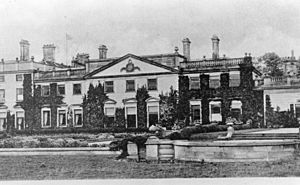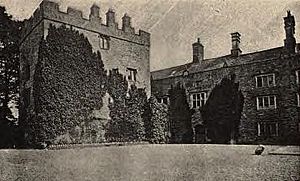Sir Gilfrid Lawson, 6th Baronet facts for kids
Sir Gilfrid Lawson, 6th Baronet (1675–1749) was an important English lawyer and politician. He came from Brayton Hall in Cumbria, England. Sir Gilfrid was a member of the English House of Commons from 1701 to 1705. Later, he served in the British House of Commons from 1708 to 1734. A "Baronet" is a special title, like a knight, that is passed down through families.
Contents
Early Life and Education
Gilfrid Lawson was born in 1675. His father was Wilfred Lawson, who also lived at Brayton Hall in Cumberland (now part of Cumbria). His mother was Sarah James.
Gilfrid's grandfather was Sir Wilfrid Lawson, 1st Baronet. His grandfather made sure that Gilfrid's father received Brayton Hall. Gilfrid's uncle, the older son, inherited the main family title and Isel Hall.
Gilfrid went to Queen's College, Oxford University in 1695. He then studied law at Gray's Inn in 1700. He officially became a lawyer in 1702. In 1710, he inherited Brayton Hall after his father passed away.
Political Career
Sir Gilfrid Lawson became a Member of Parliament (MP) for Cumberland. This means he was chosen to represent the people of Cumberland in the British Parliament.
He was first elected without anyone running against him in 1701. He was elected again in 1702, even though his cousin, Sir Wilfred Lawson, also ran for the same spot.
Sir Gilfrid was a member of the Tory political party. He was known as a moderate Tory. This means he held traditional views but was not extreme. He was also part of a group called the "October Club."
Speaking Out in Parliament
In Parliament, Sir Gilfrid was known for speaking his mind. In 1717, a politician named James Stanhope, 1st Earl Stanhope suggested that Parliament should give money to help other countries. Sir Gilfrid disagreed. He said that if members of Parliament couldn't speak freely without being called "enemies of the King," then they should just go home. He believed in the importance of "freedom of debate," which means being able to discuss ideas openly.
In 1720, he spoke strongly against the leaders of the South Sea Company. This company was involved in a big financial scandal at the time. He helped push for a special committee to investigate what happened with the company.
Later Years in Parliament
Sir Gilfrid was re-elected as an MP for Cumberland in 1722 and again in 1727. In 1723, he spoke against a bill that would punish Francis Atterbury. Sir Gilfrid felt there wasn't enough proof to punish him.
In 1730, he spoke in favor of removing a tax on salt. He believed this tax hurt poor people the most. He also spoke against removing a tax on Irish yarn and against a bill about wool.
Sir Gilfrid decided to retire from Parliament in 1734. He supported his cousin, Sir Joseph Pennington, to take his place.
Later Life and Family Legacy
In 1743, Sir Gilfrid inherited the title of Baronet and the Isel estate from his cousin, Sir Mordaunt Lawson.
Sir Gilfrid Lawson never married. He passed away on August 23, 1749. After his death, his brother Alfred inherited the Baronet title.
After Alfred passed away in 1752, his oldest son, Wilfrid, became the 8th Baronet. This was Sir Wilfrid Lawson, 8th Baronet (1712–1763). He became the Sheriff of Cumberland in 1756. In 1761, he also became an MP for Cumberland. Sir Wilfrid died in 1763 without any children, so the Baronet title then went to his brother, Sir Gilfrid Lawson, 9th Baronet.
 | Sharif Bey |
 | Hale Woodruff |
 | Richmond Barthé |
 | Purvis Young |



